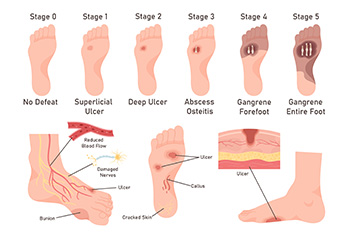
Gangrene is a serious condition that occurs when tissue dies due to a lack of blood flow or an infection. People with diabetes are at a higher risk of developing gangrene, particularly in the feet, toes, and ankles, as a result of poor circulation and a reduced ability to heal wounds. High blood sugar can damage nerves, leading to loss of sensation, which makes it difficult to detect injuries. Small cuts, blisters, or ulcers may go unnoticed, increasing the chance of infection. If an infection worsens, tissue death can occur, and surgery may be required to remove the affected area. Signs of gangrene include skin discoloration, swelling, foul-smelling discharge, and numbness. If left untreated, the infection can spread and lead to severe complications. A podiatrist can help by identifying foot problems early, treating wounds before they worsen, and recommending strategies to improve circulation. Regular foot exams are essential for preventing complications like gangrene. If you have diabetes and suffer from foot ulcers, it is suggested that you schedule regular appointments with a podiatrist for checkups and appropriate care.
Diabetic foot care is important in preventing foot ailments such as ulcers. If you are suffering from diabetes or have any other concerns about your feet, contact one of our podiatrists from Active Foot and Ankle Care, LLC. Our doctors can provide the care you need to keep you pain-free and on your feet.
Diabetic Foot Care
Diabetes affects millions of people every year. The condition can damage blood vessels in many parts of the body, especially the feet. Because of this, taking care of your feet is essential if you have diabetes, and having a podiatrist help monitor your foot health is highly recommended.
The Importance of Caring for Your Feet
- Routinely inspect your feet for bruises or sores.
- Wear socks that fit your feet comfortably.
- Wear comfortable shoes that provide adequate support.
Patients with diabetes should have their doctor monitor their blood levels, as blood sugar levels play such a huge role in diabetic care. Monitoring these levels on a regular basis is highly advised.
It is always best to inform your healthcare professional of any concerns you may have regarding your feet, especially for diabetic patients. Early treatment and routine foot examinations are keys to maintaining proper health, especially because severe complications can arise if proper treatment is not applied.
If you have any questions please feel free to contact our offices located in Fair Lawn, Riverdale, and Englewood, NJ . We offer the newest diagnostic and treatment technologies for all your foot and ankle needs.






